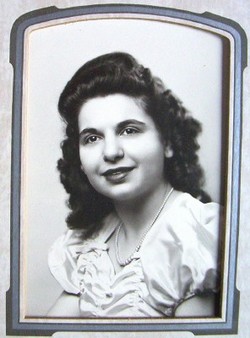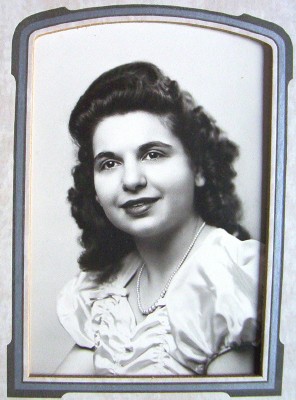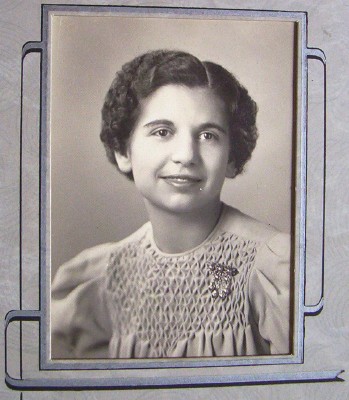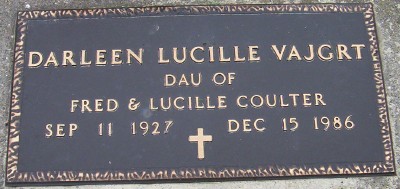Darleen was nearly kidnapped by gypsies in the late 1920s. Her mother Lucille went to the south 80 acres with her husband to help him with fieldwork. Not wanting to leave her baby daughter Darleen (born 1927) alone in the house---which was never locked---she took her along and placed the child with her doll on a blanket at the edge of the field, beside the quiet dirt country road.
Lucille was near the middle of the field with her husband Fred when a horse-drawn, gaily-painted wagon of gypsies came down the road. They spotted little Darleen on her blanket and cheerfully called and gestured for her to come to them. Darleen stood up and started walking towards them. Mother dropped her hoe and ran as fast as she could. She reached Darleen just as the gypsies were reaching from their wagon to grab her to them. Close call!
In 1945, the Monday after she graduated from Conrad High School, Darleen started working as a salesgirl at Montgomery Ward Department Store on Main Street of Marshalltown, Iowa, across the street from the stately Marshall County courthouse built in 1886. She recognized her first customer, Leonard Vajgrt. They had both attended school at Conrad, Leonard being several years ahead of Darleen. He never graduated, since after two years of high school, the government drafted him into the Army on 27 August 1943 at Camp Dodge northwest of Des Moines, Iowa (despite the government's later assertion that students were never drafted!) Leonard told Darleen he wanted to buy some nylon stockings for his older sister Agnes. "Do you know what size Aggie wears?" Darleen asked. "No," he answered, "But she has beautiful legs just like yours." Darleen blushed; and thus began their romance. (Those of you "of a certain age" will recall how scarce nylon stockings were during the war, since nylon was needed in the war effort for military purposes.)
Darleen & Leonard married on 2 June 1946, at the First Presbyterian Church of Conrad, Iowa.
To Mourn or to Wed... or Both!
Darleen's wedding invitations had already been mailed when her grandmother Etta Crecelius Coulter died on May 7, 1946, following surgery for colon cancer. Some thought the wedding should be postponed. Darleen left the decision to her father. Fred decided his mother would have said: "Life is for the living. Go on with the wedding."
And so he walked his 18-year-old daughter down the aisle on the scheduled date, though his heart was heavy with the loss of his beloved mother.
A Sad End:
Leonard had taken part in the January 1944 Allied invasion of Anzio, Italy, and was wounded, including pieces of shrapnel in his brain. Doctors refused to remove the shrapnel, fearing Lennie wouldn't survive the delicate operation. The shrapnel caused excruciating headaches. Finally, in September 1962, Lennie could stand it no longer. He put the barrel of his shotgun in his mouth, intending to blow out his brains. But the gun shifted as he pulled the trigger, and blew out the left side of his face and removed part of one ear. He was hospitalized at the veterans' hospital at Fort Snelling in St. Paul, Minnesota, where he received numerous electrical shock treatments. My parents would visit him, and when they would get up to leave, he would cling to his mother-in-law and beg her to take him home with her. Lennie was 17 when his widowed mother Anna had died in 1942; and his mother-in-law was like a second mother to him.
Finally the doctors declared Lennie "cured!" and they sent him home. He suffered the bad headaches for 10-1/2 more years. February 15, 1973, was the 32nd anniversary of the 1941 death of Lennie's father, Fred Vajgrt. Lennie took his wife to work at Wards. His demeanor that morning concerned her, and when Lennie didn't show up to deliver furniture as scheduled, she asked a co-worker to drive her home. She arrived too late. Lennie, age 48, had used a hanging rope tied to a rafter in their garage to end 29 years of endless headaches. And he had picked the anniversary of his father's death to do it. Darleen grabbed his legs and tried to lift him up, to no avail. I consider Lennie a casualty of the war, even though he didn't die on the beach at Anzio in January 1944.
Lennie's widow, my sister Darleen, had to quickly choose a casket and a spot to bury it. Lennie's parents, Fred & Anna Chizek Vajgrt, rest in Rock Valley Cemetery at LeGrand, Iowa. Darleen decided she would rather rest one day in the bosom of her family in Conrad cemetery, with her beloved Lennie beside her.
Her parents' lot, half of Lot #20 in Section 1, on the north edge of the cemetery, contained just four spaces: a vacant plot reserved for our mother Lucille, next to the grave of our father, Fred Coulter Sr., who was beside his first wife Verna, and their eldest daughter Joyce, who had drowned in a barnyard stock tank in 1917, age 19 months. Verna had died of ptomaine poisoning in 1920, age 30, after eating at the New Virginia Pure Food Cafe in Marshalltown, Iowa. (some "pure food"!) She had gone to town to visit her eight-year-old son, Junior, who was hospitalized after having had his tonsils removed.
Darleen decided to buy two vacant plots in the newer eastern section of the cemetery. But I pointed out two vacant spaces in the northeast quarter of our Crecelius family's older lot: Lot #2 in Section 1. Already there were Darleen's grandparents, Aaron & Etta Crecelius Coulter, Etta's parents, George & Elizabeth Keller Crecelius; their grandson Verne Alonzo Crecelius, who had died in 1892, age 15 days; and a great-great-grandson, Stanley Dickenson, who had died in a barnyard accident in 1951, age 20 months. Great-grandmother Elizabeth had been the first burial, in 1870, in what was then a family burying ground for the Conrads and Creceliuses. Elizabeth had died at age 42, leaving her widower George with seven children to raise. George joined his beloved Elizabeth 49 years later, in 1919. By then the bustling burial ground was the cemetery for the entire community; and it was found that perpetual care had never been purchased for Lot #2. So Grandmother Etta Crecelius Coulter paid the fee.
I visited the family's patriarch, my uncle Guy Coulter, age 90, in Conrad, where he lived with his second wife Bessie on Center Street. He was fine with Darleen using the vacant quarter section.
But to keep peace in the family, Darleen insisted on paying the 1973 going rate for two plots in Conrad Cemetery. Like I said, this happened over 40 years ago. I don't recall the amount: $400 perhaps? Aaron & Etta had five children; so Darleen wrote four checks, each for 1/5th the total. I wrote a cover letter of explanation for the checks. I delivered Uncle Guy's check to him, and mailed his siblings': to Aunt Ella Diller and Aunt Lois Mullen in Pasadena, California, and to Uncle Arch Coulter in Charlo, Montana.
The remaining fifth would have gone to my father, who had died in 1964 of a heart attack, age 77. So his fifth was divided between his five living children; and I delivered checks to my brother Fred Jr. and to my sister, Sue Lynne Freese. I mailed a check to my sister Doris Dickenson, who lived out of state. I returned my fifth of a fifth check, uncashed, to Darleen; and if I recall correctly, Aunt Ella also returned her check, uncashed.
On a bone-chilling, wintry day on that windswept cemetery hill, Lennie was buried with military honors: a volley of rifles, a poignant playing of Taps on echoing cornets, the U.S. flag atop the coffin, then folded properly in triangles and presented to the veteran soldier's widow. Thirteen years later, on a cold, windy day in December 1986, Darleen joined Lennie after she was felled by colon cancer and a heart attack at age 59.
And how fitting that Darleen should rest between two people she loved deeply: her husband and her grandmother Coulter. Indeed, in the spring of 1945, when she started working at Wards, she roomed several blocks north with her Coulter grandparents at 4 East Webster Street. Out of her take-home pay of around $14 a week, she gave her grandmother $7 a week for board & room (a dollar a day), which included breakfast, supper, and use of an old bed & dresser in a corner of the basement. Grandmother also rented other rooms upstairs to respectable, unmarried young ladies, some of whom were schoolteachers in the nearby junior college.
Darleen had continued working at Montgomery Ward for 41-1/2 years. She rose to the position of office manager. I visited her for Thanksgiving 1986 at her home in Bloomington, Minnesota, and I quickly realized how ill she was. I begged her to quit working and come live with me in Des Moines. She consented, but said she wanted to work one more Christmas season, with all its hustle & bustle & joy. I agreed; but it was not to be. A heart attack took her on 15 December. My sister Darleen was a dear person, who saw the good in everyone she met. I miss her.
Steven Coulter
Darleen was nearly kidnapped by gypsies in the late 1920s. Her mother Lucille went to the south 80 acres with her husband to help him with fieldwork. Not wanting to leave her baby daughter Darleen (born 1927) alone in the house---which was never locked---she took her along and placed the child with her doll on a blanket at the edge of the field, beside the quiet dirt country road.
Lucille was near the middle of the field with her husband Fred when a horse-drawn, gaily-painted wagon of gypsies came down the road. They spotted little Darleen on her blanket and cheerfully called and gestured for her to come to them. Darleen stood up and started walking towards them. Mother dropped her hoe and ran as fast as she could. She reached Darleen just as the gypsies were reaching from their wagon to grab her to them. Close call!
In 1945, the Monday after she graduated from Conrad High School, Darleen started working as a salesgirl at Montgomery Ward Department Store on Main Street of Marshalltown, Iowa, across the street from the stately Marshall County courthouse built in 1886. She recognized her first customer, Leonard Vajgrt. They had both attended school at Conrad, Leonard being several years ahead of Darleen. He never graduated, since after two years of high school, the government drafted him into the Army on 27 August 1943 at Camp Dodge northwest of Des Moines, Iowa (despite the government's later assertion that students were never drafted!) Leonard told Darleen he wanted to buy some nylon stockings for his older sister Agnes. "Do you know what size Aggie wears?" Darleen asked. "No," he answered, "But she has beautiful legs just like yours." Darleen blushed; and thus began their romance. (Those of you "of a certain age" will recall how scarce nylon stockings were during the war, since nylon was needed in the war effort for military purposes.)
Darleen & Leonard married on 2 June 1946, at the First Presbyterian Church of Conrad, Iowa.
To Mourn or to Wed... or Both!
Darleen's wedding invitations had already been mailed when her grandmother Etta Crecelius Coulter died on May 7, 1946, following surgery for colon cancer. Some thought the wedding should be postponed. Darleen left the decision to her father. Fred decided his mother would have said: "Life is for the living. Go on with the wedding."
And so he walked his 18-year-old daughter down the aisle on the scheduled date, though his heart was heavy with the loss of his beloved mother.
A Sad End:
Leonard had taken part in the January 1944 Allied invasion of Anzio, Italy, and was wounded, including pieces of shrapnel in his brain. Doctors refused to remove the shrapnel, fearing Lennie wouldn't survive the delicate operation. The shrapnel caused excruciating headaches. Finally, in September 1962, Lennie could stand it no longer. He put the barrel of his shotgun in his mouth, intending to blow out his brains. But the gun shifted as he pulled the trigger, and blew out the left side of his face and removed part of one ear. He was hospitalized at the veterans' hospital at Fort Snelling in St. Paul, Minnesota, where he received numerous electrical shock treatments. My parents would visit him, and when they would get up to leave, he would cling to his mother-in-law and beg her to take him home with her. Lennie was 17 when his widowed mother Anna had died in 1942; and his mother-in-law was like a second mother to him.
Finally the doctors declared Lennie "cured!" and they sent him home. He suffered the bad headaches for 10-1/2 more years. February 15, 1973, was the 32nd anniversary of the 1941 death of Lennie's father, Fred Vajgrt. Lennie took his wife to work at Wards. His demeanor that morning concerned her, and when Lennie didn't show up to deliver furniture as scheduled, she asked a co-worker to drive her home. She arrived too late. Lennie, age 48, had used a hanging rope tied to a rafter in their garage to end 29 years of endless headaches. And he had picked the anniversary of his father's death to do it. Darleen grabbed his legs and tried to lift him up, to no avail. I consider Lennie a casualty of the war, even though he didn't die on the beach at Anzio in January 1944.
Lennie's widow, my sister Darleen, had to quickly choose a casket and a spot to bury it. Lennie's parents, Fred & Anna Chizek Vajgrt, rest in Rock Valley Cemetery at LeGrand, Iowa. Darleen decided she would rather rest one day in the bosom of her family in Conrad cemetery, with her beloved Lennie beside her.
Her parents' lot, half of Lot #20 in Section 1, on the north edge of the cemetery, contained just four spaces: a vacant plot reserved for our mother Lucille, next to the grave of our father, Fred Coulter Sr., who was beside his first wife Verna, and their eldest daughter Joyce, who had drowned in a barnyard stock tank in 1917, age 19 months. Verna had died of ptomaine poisoning in 1920, age 30, after eating at the New Virginia Pure Food Cafe in Marshalltown, Iowa. (some "pure food"!) She had gone to town to visit her eight-year-old son, Junior, who was hospitalized after having had his tonsils removed.
Darleen decided to buy two vacant plots in the newer eastern section of the cemetery. But I pointed out two vacant spaces in the northeast quarter of our Crecelius family's older lot: Lot #2 in Section 1. Already there were Darleen's grandparents, Aaron & Etta Crecelius Coulter, Etta's parents, George & Elizabeth Keller Crecelius; their grandson Verne Alonzo Crecelius, who had died in 1892, age 15 days; and a great-great-grandson, Stanley Dickenson, who had died in a barnyard accident in 1951, age 20 months. Great-grandmother Elizabeth had been the first burial, in 1870, in what was then a family burying ground for the Conrads and Creceliuses. Elizabeth had died at age 42, leaving her widower George with seven children to raise. George joined his beloved Elizabeth 49 years later, in 1919. By then the bustling burial ground was the cemetery for the entire community; and it was found that perpetual care had never been purchased for Lot #2. So Grandmother Etta Crecelius Coulter paid the fee.
I visited the family's patriarch, my uncle Guy Coulter, age 90, in Conrad, where he lived with his second wife Bessie on Center Street. He was fine with Darleen using the vacant quarter section.
But to keep peace in the family, Darleen insisted on paying the 1973 going rate for two plots in Conrad Cemetery. Like I said, this happened over 40 years ago. I don't recall the amount: $400 perhaps? Aaron & Etta had five children; so Darleen wrote four checks, each for 1/5th the total. I wrote a cover letter of explanation for the checks. I delivered Uncle Guy's check to him, and mailed his siblings': to Aunt Ella Diller and Aunt Lois Mullen in Pasadena, California, and to Uncle Arch Coulter in Charlo, Montana.
The remaining fifth would have gone to my father, who had died in 1964 of a heart attack, age 77. So his fifth was divided between his five living children; and I delivered checks to my brother Fred Jr. and to my sister, Sue Lynne Freese. I mailed a check to my sister Doris Dickenson, who lived out of state. I returned my fifth of a fifth check, uncashed, to Darleen; and if I recall correctly, Aunt Ella also returned her check, uncashed.
On a bone-chilling, wintry day on that windswept cemetery hill, Lennie was buried with military honors: a volley of rifles, a poignant playing of Taps on echoing cornets, the U.S. flag atop the coffin, then folded properly in triangles and presented to the veteran soldier's widow. Thirteen years later, on a cold, windy day in December 1986, Darleen joined Lennie after she was felled by colon cancer and a heart attack at age 59.
And how fitting that Darleen should rest between two people she loved deeply: her husband and her grandmother Coulter. Indeed, in the spring of 1945, when she started working at Wards, she roomed several blocks north with her Coulter grandparents at 4 East Webster Street. Out of her take-home pay of around $14 a week, she gave her grandmother $7 a week for board & room (a dollar a day), which included breakfast, supper, and use of an old bed & dresser in a corner of the basement. Grandmother also rented other rooms upstairs to respectable, unmarried young ladies, some of whom were schoolteachers in the nearby junior college.
Darleen had continued working at Montgomery Ward for 41-1/2 years. She rose to the position of office manager. I visited her for Thanksgiving 1986 at her home in Bloomington, Minnesota, and I quickly realized how ill she was. I begged her to quit working and come live with me in Des Moines. She consented, but said she wanted to work one more Christmas season, with all its hustle & bustle & joy. I agreed; but it was not to be. A heart attack took her on 15 December. My sister Darleen was a dear person, who saw the good in everyone she met. I miss her.
Steven Coulter
Family Members
Sponsored by Ancestry
Advertisement
Explore more
Sponsored by Ancestry
Advertisement










